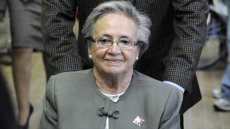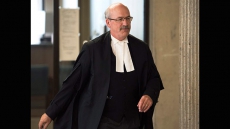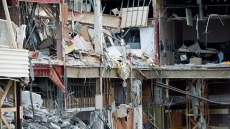OTTAWA - The Harper government is refusing to disclose how much it will cost taxpayers to separate the commissioner of elections from Elections Canada — a move Conservatives insisted upon even though electoral experts said it was unnecessary.
The government says all briefing materials on the cost and logistics of transferring the election commissioner's operations to the director of public prosecutions are cabinet confidences.
As such, they can't be released in response to an access-to-information request.
Moving the election commissioner under the auspices of the public prosecutor was a key measure in a controversial overhaul of election laws pushed through Parliament by the Conservatives last spring despite near-universal condemnation by electoral experts at home and abroad.
Democratic Reform Minister Pierre Poilievre insisted the move was necessary to ensure the commissioner's independence from the chief electoral officer, whom Conservatives contend is biased against their party.
Poilievre was unmoved by electoral experts — including current commissioner Yves Cote and former commissioner William Corbett — who argued the commissioner already had unfettered independence to carry out investigations into suspected electoral wrongdoing as he saw fit.
Corbett and Cote also said they had never experienced any interference from chief electoral officer Marc Mayrand or his predecessor.
The chief electoral officer administers election laws while the commissioner enforces them and investigates breaches. The director of public prosecutions decides whether or not to lay charges.
Poilievre's office did not respond to a request for comment on the government's refusal to release any information on the cost of separating the commissioner's operations from Elections Canada.
But Jean-Pierre Kingsley, a former chief electoral officer, was incredulous that briefing materials on the expected cost are being kept secret. If that's considered a cabinet confidence, he said "everything is a cabinet confidence."
"It defies understanding," he said in an interview.
The separation legally came into force last week. But the commissioner and his staff of about 25 are still housed in the same premises as Elections Canada and will remain there until early next year, when they'll be moved to new offices about a block away.
Michelle Laliberte, spokeswoman for the commissioner's office, said the physical move to new office space will account for the biggest share of the cost. But until the move is complete, she said it's impossible to guess what the price tag will be.
For now, she said the only additional cost has been hiring her to handle communications for the office, since the commissioner can no longer use Elections Canada's communications shop to respond to media queries on his behalf.
Kingsley predicted the commissioner will need to hire other new staff, to handle budgeting and human resources, among other things that used to be done by Elections Canada.
"I don't think it was necessary," he said of the move.
"I don't think we're going to be adding anything in terms of the system (of investigating electoral wrongdoing). What we're going to be adding is cost."
Former commissioner Corbett said the move is not only unnecessary but potentially damaging.
It distances the auditors at Elections Canada, who pore through campaign returns and party financial reports, from the investigators who are asked to look into anything suspicious, he said. And it undermines the principle of keeping a "strict arm's length relationship" between the director of public prosecutions and any investigative agency.
While the government has scoffed at such concerns, the public prosecutor and the commissioner felt compelled to publish a statement of principles last week emphasizing that "the investigative and prosecutorial functions continue to be separate and distinct despite the fact that the commissioner and the director now operate within the same organization."





